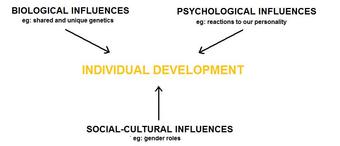coll. - Boundless Psychology
Here you can read online coll. - Boundless Psychology full text of the book (entire story) in english for free. Download pdf and epub, get meaning, cover and reviews about this ebook. year: 0, publisher: Lumen Learning, genre: Science. Description of the work, (preface) as well as reviews are available. Best literature library LitArk.com created for fans of good reading and offers a wide selection of genres:
Romance novel
Science fiction
Adventure
Detective
Science
History
Home and family
Prose
Art
Politics
Computer
Non-fiction
Religion
Business
Children
Humor
Choose a favorite category and find really read worthwhile books. Enjoy immersion in the world of imagination, feel the emotions of the characters or learn something new for yourself, make an fascinating discovery.

Boundless Psychology: summary, description and annotation
We offer to read an annotation, description, summary or preface (depends on what the author of the book "Boundless Psychology" wrote himself). If you haven't found the necessary information about the book — write in the comments, we will try to find it.
Boundless Psychology — read online for free the complete book (whole text) full work
Below is the text of the book, divided by pages. System saving the place of the last page read, allows you to conveniently read the book "Boundless Psychology" online for free, without having to search again every time where you left off. Put a bookmark, and you can go to the page where you finished reading at any time.
Font size:
Interval:
Bookmark:
Psychology is the scientific study of human mental processes and behavior.
Identify the major branches of the field of psychology
- Psychology is an academic and applied discipline that seeks to understand the behavior, mental functions, and emotional processes of human beings.
- Psychologists explore how mental and emotional factors influence individual development and behavior, and how these factors themselves can be influenced by physiological and biological processes.
- Clinical psychologists focus on the diagnosis and treatment of mental illness; they usually work directly with clients using various forms of therapeutic treatment.
- Research psychologists use scientific methods to explore a wide range of topics related to mental health and behavior.
Having both psychological and social elements.
cognitiveThe part of mental functioning that deals with logic and memories, as opposed to affective functioning, which deals with emotions.
socioculturalOf or relating to both society and culture.
Psychology is the academic and applied study of mental functions and behaviors. The word "psychology" comes from two specific Greek wordspsyche, which means "soul," "life," or "mind," and logia, which means "the study of." Simply put, psychology is the study of the mind. The overarching goal of psychology is to understand the behavior, mental functions, and emotional processes of human beings.This field ultimately aims to benefit society, partly through its focus on better understanding of mental health and mental illness.
Most psychologists can be classified as social, behavioral, or cognitive scientists. Psychologists study many different areas, including biological foundations, mental well-being, change and development over time, the self and others, and potential dysfunctions.They explore how psychological factors interact with biological and sociocultural factors to influence individual development. Psychologists attempt to understand not only the role of mental functions in individual and social behavior, but also the physiological and biological processes that underlie cognitive functions and behaviors.

Psychology seeks to understand how psychological factors interact with sociocultural and biological factors to influence individual development.
Psychology explores concepts such as perception, cognition, attention, emotion, phenomenology, motivation, brain functioning, personality, behavior, resilience, the unconscious mind, and interpersonal relationships. The resulting knowledge is then applied to various spheres of human activity, including the problems of individuals' daily lives and the treatment of mental illness. Psychology has been described as a "hub science" because psychological research has links to the social sciences, natural sciences, medicine, and the humanities (such as philosophy).
Clinical psychology focuses on the diagnosis and treatment of mental disorders and mental illness. Psychologists working in a clinical capacity (such as therapists or counselors) work with clients who are struggling with mental illness to assess, diagnose, and implement various forms of therapeutic treatment. Much of this treatment is based on clinical research.
While clinical psychologists tend to work directly with clients, non-clinical psychologists focus more heavily on research. Research psychologists employ scientific methods to explore relationships between various psychosocial variables and examine a wide range of topics related to mental processes and behavior. Researchers and other non-clinical psychologists often work in university psychology departments or teach in other academic settings (e.g., medical schools or hospitals). Some are employed in industrial and organizational settings, in health-care settings, in the media, in sports, or in forensic investigation and other law-related fields.
The field of psychology emerged as a scientific discipline in the 19th century, but its roots go back to ancient philosophy.
Describe the philosophical roots of what would later become the field of psychology
- Early Greek philosophers such as Socrates, Plato, and Aristotle explored topics such as pleasure, pain, knowledge, motivation, rationality, and mental illnesstopics often discussed in psychology today.
- In the 17th century, French mathematician and philosopher Ren Descartes theorized that the body and mind are separate entities. This concept came to be known as dualism.
- English philosophers Thomas Hobbes and John Locke disagreed with the concept of dualism, arguing instead that sensations, images, thoughts, and feelings are physical processes that occur within the brain.
- Psychology became a self-conscious field of experimental study in 1879, when German scientist Wilhelm Wundt founded the first laboratory dedicated exclusively to psychological research.
- Edward B. Titchener expanded upon Wundt's ideas to found the theory of structuralism, which attempted to understand the mind as the sum of varying underlying parts.
- Functionalism, founded by William James in the late 19th century, offered an alternative to structuralism by focusing largely on the functions of the mind.
In psychology, the belief that the mind and body are intricately connected rather than separate entities.
dualismIn psychology, the belief that the mind and body are separate entities.
psychoneuroimmunologyThe study of the interactions between behavioral, neural, endocrine, and immune functions.
Many cultures throughout history have speculated on the nature of the mind, heart, soul, spirit, and brain. Philosophical interest in behavior and the mind dates back to the ancient civilizations of Egypt, Greece, China, and India. Psychology was largely a branch of philosophy until the mid-1800s, when it developed as an independent and scientific discipline in Germany and the United States. These philosophical roots played a large role in the development of the field.
From approximately 600 to 300 BC, Greek philosophers explored a wide range of topics relating to what we now consider psychology. Socrates and his followers, Plato and Aristotle, wrote about such topics as pleasure, pain, knowledge, motivation, and rationality. They theorized about whether human traits are innate or the product of experience, which continues to be a topic of debate in psychology today. They also considered the origins of mental illness, with both Socrates and Plato focusing on psychological forces as the root of such illnesses.

Plato, Aristotle, and other ancient Greek philosophers examined a wide range of topics relating to what we now consider psychology.
Ren Descartes, a French mathematician and philosopher from the 1600s, theorized that the body and mind are separate entities, a concept that came to be known as dualism. According to dualism, the body is a physical entity with scientifically measurable behavior, while the mind is a spiritual entity that cannot be measured because it transcends the material world. Descartes believed that the two interacted only through a tiny structure at the base of the brain called the pineal gland.
Font size:
Interval:
Bookmark:
Similar books «Boundless Psychology»
Look at similar books to Boundless Psychology. We have selected literature similar in name and meaning in the hope of providing readers with more options to find new, interesting, not yet read works.
Discussion, reviews of the book Boundless Psychology and just readers' own opinions. Leave your comments, write what you think about the work, its meaning or the main characters. Specify what exactly you liked and what you didn't like, and why you think so.


















